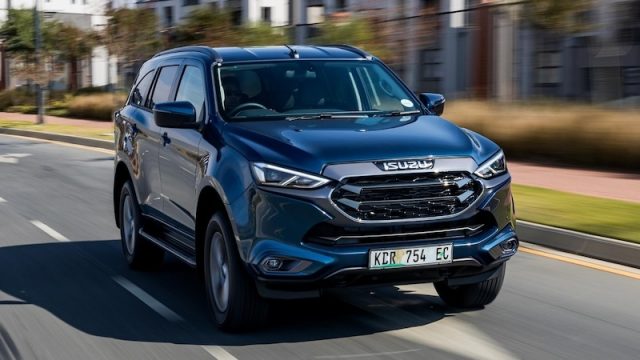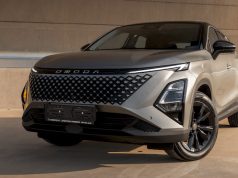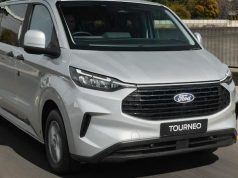For many years, the Isuzu mu-X was only available with a three-litre, turbo-diesel engine. Recently, its manufacturer introduced a more affordable version, which uses the 1,9-litre engine. Does it hit the mark? We tested it over 3 000 km.
To properly test this new, 1,9-litre mu-X, we took it on a long excursion, driving it from Cape Town to Pretoria on a return journey. The voyage north was without luggage, but the trek to the south involved towing a 750 kg trailer and a fully loaded cabin.
Comfort
On a long trek, comfort is vital. The seats in the mu-X score full marks, so a long journey doesn’t wear you out. The driver’s and front passenger seats are electrically adjustable and there’s leather upholstery for the seven seats, steering wheel, and gear lever.
The second-row seats offer sufficient legroom and it’s easy to tilt them forward to gain access to the third row. The latter is useful at times, but it’s not intended for adults – not over longer distance anyway. The third row easily folds flat to create a large luggage compartment.
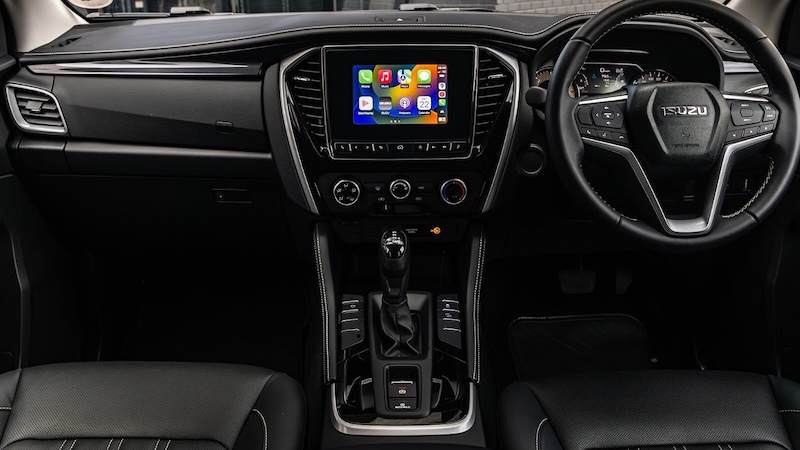
Equipment
Up front, the small seven-inch touch screen initially looks like an excuse, but in practice its size is more than adequate. It integrates with Apple, Android, and USB charging ports, and plays music through the car’s six speakers.
During South African summers, an effective airconditioner is a lifesaver. This unit’s fan sometimes had trouble settling on the chosen speed. It’s strange, because it’s manually operated, not an automatic “climate control” system. What’s more is that it occasionaly struggled to keep the cabin cool in the Northern Cape’s scorching heat.
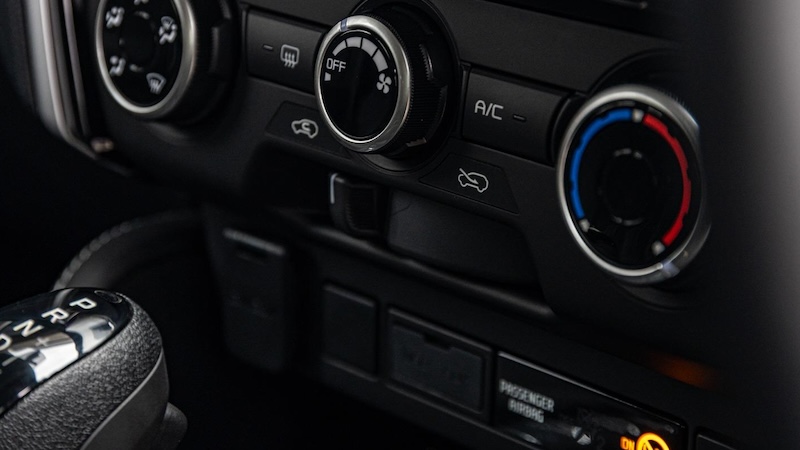
The fuel gauge also had its wires crossed. One day it showed the distance to empty (DTE) as 600 km, but when I restarted the car minutes later, it showed just 300 km. This only happened once (and resolved itself), but it seems to be an mu-X ailment that rears its head from time to time.
Other irritations were the driver’s sun visor that doesn’t have a makeup mirror and that it is difficult to fit the roll-up tarpaulin that covers the luggage compartment. This struggle causes it to scratch the plastic panels on either side of the luggage compartment.
Safety
The mu-X 1.9 LS is a reassuringly safe car. Its equipment include electronic stability control (ESC) with traction control, ABS brakes with electronic brake force distribution (EBD) and brake assist (BAS), hill start assist, hill descent control, trailer sway control and cruise control. Seven airbags further protect the occupants. Front and rear parking sensors, as well as a reversing camera, make parking safe and easy.
LED lights are standard across the range for the daytime running lights, Bi-LED headlights, fog lights, and taillights.
Power
The 1.9 liter engine, which also serves in the D-Max, develops a modest 110 kW and 350 Nm. That’s much less than the Isuzu three-litre’s 140 kW and 450 Nm. Its output is also less than the 2.4 Toyota Fortuner’s. The table below compares the 1,9’s power and torque figures to those of similar vehicles.
| Isuzu m-UX 1.9 | Fortuner 2.4 | Pajero Sport 2.4 | Ford Everest 2.0 | |
| Power | 110 kW | 110 kW | 133 kW | 154 kW |
| Torque | 350 Nm | 400 Nm | 430 Nm | 500 Nm |
| Consumption* | 7,0 ℓ/100km | 7,2 ℓ/100km | 8,1 ℓ/100km | 7,5 ℓ/100km |
| Price | R722 200 | R699 800 | R789 990 | R899 000 |
With these modest numbers, it was surprising that the junior mu-X was never short of breath. Even with the trailer hitched, it had little trouble keeping to the speed limit. The engine had to work hard at times, but it was reliable, despite the fierce Karoo heat.
Like the rest of the mu-X series, the 1.9 LS uses the latest version of Isuzu’s six-speed automatic gearbox. A rear differential lock is among the mu-X’s standard equipment.
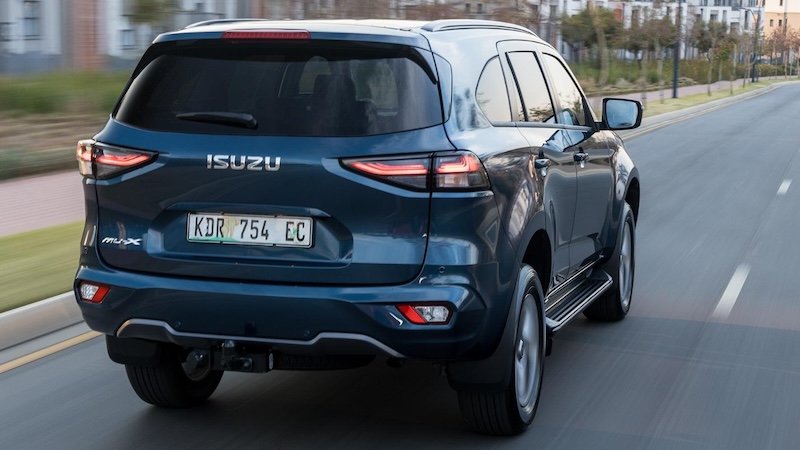
Fuel consumption
On the ‘uphill’ leg of the trip, I feathered the accelerator to get the best possible mileage per tank, a driving method sometimes referred to as hypermiling. This can even include driving in the slipstream of a truck right ahead of you, but I didn’t push it that far.
My version of hypermiling simply meant very gentle acceleration and keeping the speedo around the 110 km/h mark. In the process, the average consumption dropped to 7.52 ℓ/100km (13.3 km/ℓ). With the towing effort to the south, consumption increased by 80 percent, to 13.54ℓ/100km or 7.39 km/ℓ.
Road manners
Our route from Cape Town to Johannesburg included rough farm roads. These were often littered with large bumps and potholes, which (occasionally) made the unloaded rear of the mu-X bounce around. It is likely to be more stable when carrying weight on the rear axle.
The 1.9 LS’s maximum for towing an unbraked trailer is 750 kg. Our load was hardly aerodynamic and the overall mass close to 750 kg. Still, the ‘small’ mu-X did what exactly what was asked of it.
Tar trials
Not wanting to prolong our journey by driving along dirt roads, we confined ourselves to the black stuff on our way south. Here, the Isuzu performed impeccably.
With trailer and all, it stuck to the road as if it were on rails – and not of the Transnet kind. The Isuzu’s road manners were flawless, which instilled much confidence. This was most welcome, because the N12 is in a poor condition.
It was clear that overloaded trucks pound the road surface when the tar is close to melting point. In places, it looks like a six-year-old’s first attempt at decorating a cake. This can unsettle a vehicle and trailer, but the Isuzu was unwavering.
By the way, the mu-X rides on neat 18-inch alloy wheels and tires. It’s also equipped with a matching, full-size alloy spare wheel.
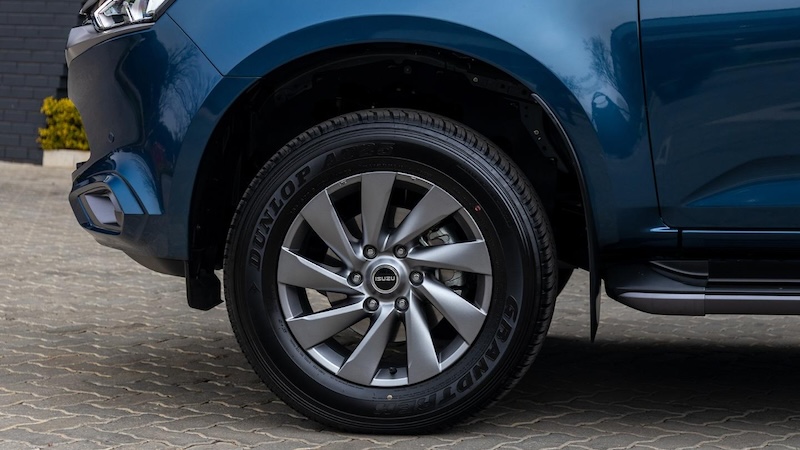
Differences between mu-X and Fortuner
The Toyota Fortuner 2.4GD-6 is the mu-X’s main rival. Both vehicles are comprehensively equipped, but there are differences that will be of interest to buyers. Here are some of them:
| Isuzu mu-X 1.9TD LS 4×2 auto | Toyota Fortuner 2.4GD-6 auto | |
| Seat upholstery | Leather (artificial) | Cloth and leather |
| Third-row seats | Fold flat | Fold up |
| 12V power sockets | Two | Three |
| Electric front seats | Yes | No |
| Adjustable lumbar support | Yes (driver, electric) | No |
| Electric handbrake | Yes | No |
| Hill-descent control | Yes | No |
| Rain-sensing wipers | Yes | No |
| Keyless entry and start | No | Yes |
| Folding side mirrors | No | Yes |
| Towing capacity | 2 100 kg | 2 500 kg |
| Service intervals | 15 000 km | 10 000 km |
| Warranty | 5 years / 120 000 km | 3 years / 100 000 km |
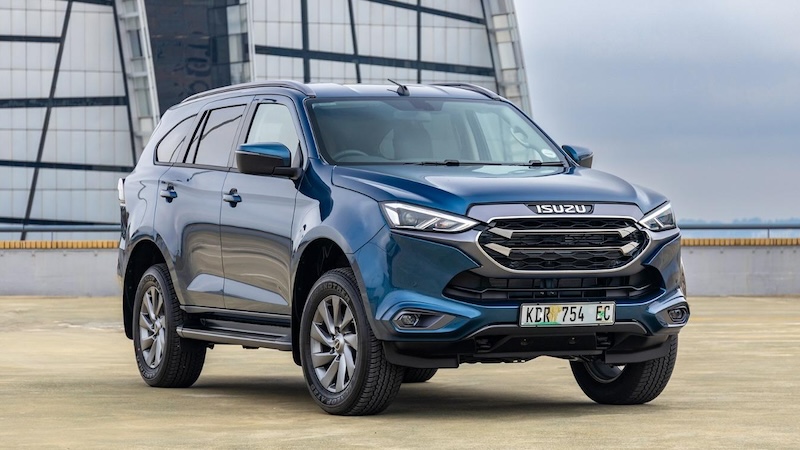
Summary
Is the mu-X 1.9 LS 4×2 AT worth its asking price? Well, it’s a versatile, quality ride with few weak points. However, those who will regularly tow heavy hauls should consider the more powerful 2.4-Fortuner or the three-litre mu-X. The latter can tow 3.5 tonnes, compared to the Fortuner’s 2.5 tonnes and the 1.9-mu-X’s 2.1 tonnes.
To be clear, the 1,9-litre engine performed admirably, but the more powerful engine will make towing effortless and even rewarding.
Unfortunately, you would have to cough up an additional R93 800 for the mu-X 3.0 LS 4×2 AT (R816 000), and for that you’re only getting a more powerful engine.
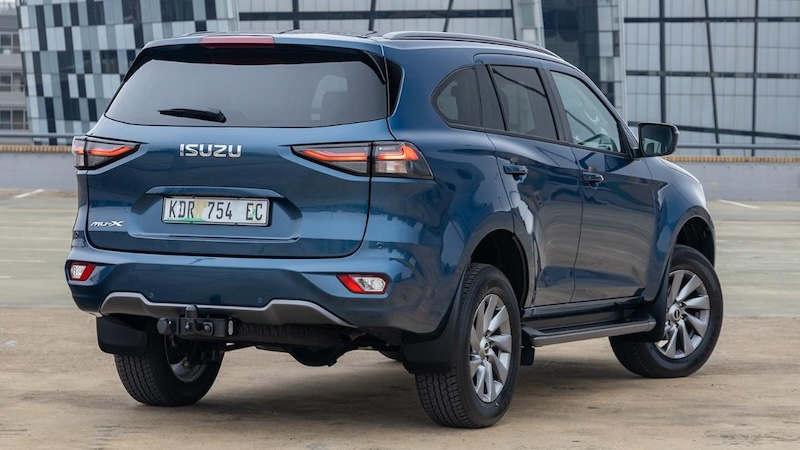
Also consider…
What can you get for more or less the same money as the Isuzu mu-X 1.9 LS 4×2 AT’s R722 200 sticker price? Here are a handful of worthy alternatives. (Note: some only have five seats, but all have automatic transmissions.)
- Mahindra Scorpio-N 2.2D Z8 4XPlor Adventure (R644 499)
- Hyundai Tucson 2.0 Executive (R655 500)
- Kia Sportage 1.6CRDi LX (R655 995)
- Volkswagen Tiguan Allspace 1.4TSI 110kW (R666 300, without extras)
- Mitsubishi Outlander 2.5 GL (R699 995)
- Toyota RAV4 2.0 GX-R AWD (R705 600)
- Toyota Fortuner 2.4GD-6 4×4 (R733 100).


